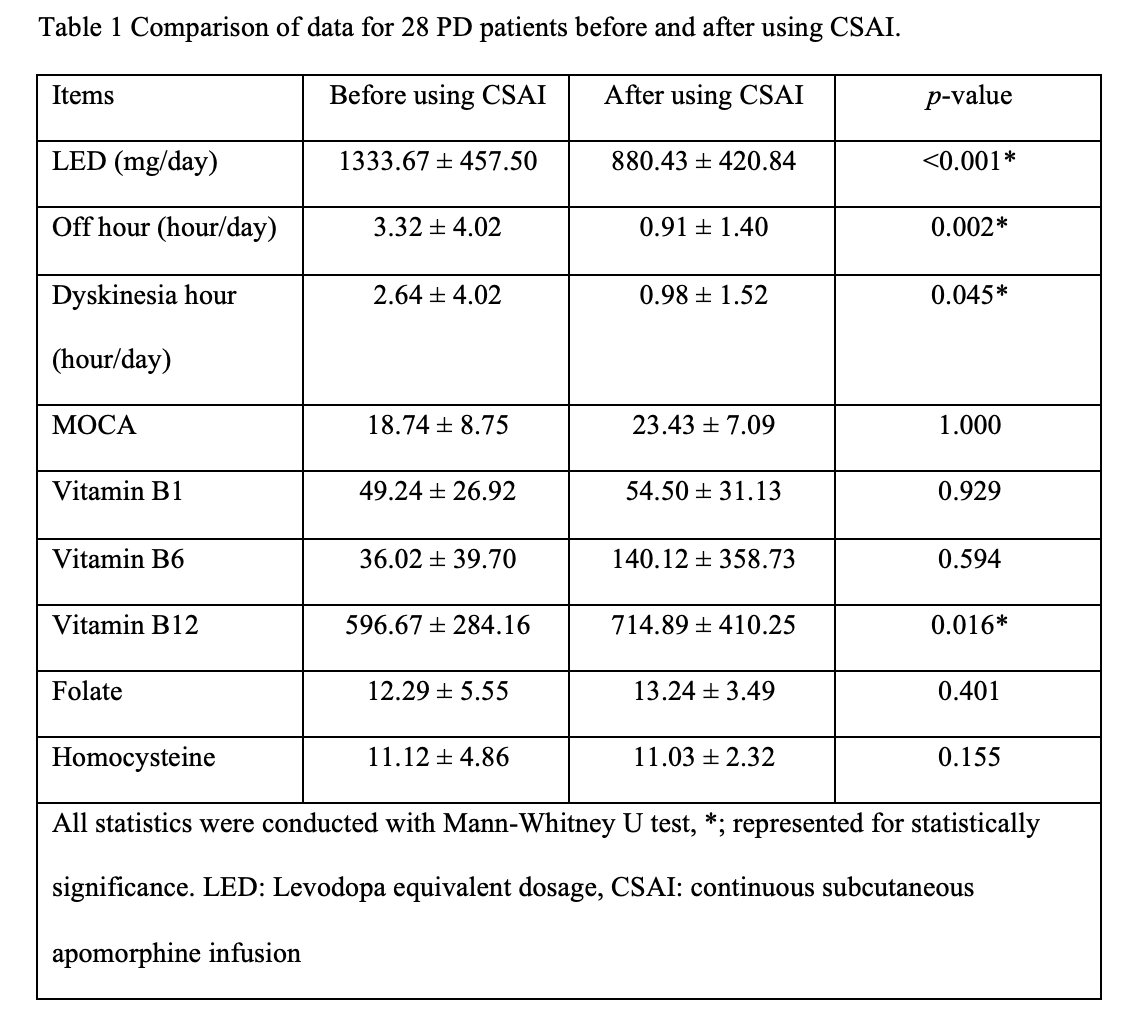Objective: To evaluate the plasma levels of vitamin B and homocysteine among 28 advanced PD patients with motor complications before and after continued used of CSAI.
Background: Long-term levodopa usage in Parkinson’s disease (PD) may pose a potential risk factor for neuropathy, gait instability, and cognitive impairment due to increased plasma homocysteine and decreased vitamin B12 levels. Advanced PD Patients who undergo continuous subcutaneous apomorphine infusion (CSAI) showed a significant reduction of levodopa consumption in long-term studies. Therefore, apomorphine may become as a promising treatment capable of reducing plasma homocysteine levels and increasing vitamin B12 levels in PD patients.
Method: We analyzed and compared the levels of plasma homocysteine, vitamin B1, B6, B12, and folate in 28 PD patients undergoing CSAI at the initiation of CSAI and during follow-up.
Results: Among the 28 PD patients using CSAI, the mean dosage of CSAI was 5.09 ± 1.59 mg/hour, and the duration of CSAI use per day was 11.27 ± 1.51 hours per day. All PD patients continued using CSAI for more than 3 months. After using CSAI, PD patients consumed fewer medications in levodopa equivalent dosage compared to before using CSAI (p<0.001). Additionally, after using CSAI, PD patients experienced reduced off-hour and dyskinesia hours compared to before using CSAI (p<0.05, respectively)
Interestingly, after using CSAI, PD patients exhibited higher levels of plasma vitamin B12 compared to before using CSAI (p=0.016). There were no differences in MOCA scores and plasma levels of vitamin B1, B6, folate, and homocysteine between before and after using CSAI (p>0.05, all).
Conclusion: This study aimed to assess vitamin B and homocysteine metabolism in PD patients with long-term CSAI usage. After continued use of CSAI, PD patients showed higher levels of vitamin B12 and reduced consumption of levodopa dosage compared to before using CSAI. These findings warrant further exploration to determine whether CSAI usage can mitigate the risk of neuropathy or cognitive impairment among PD patients.
Table 1 Comparisons before and after using CSAI.
References: Reference
1. Phokaewvarangkul O, Anan C, Phimpha A, Chaudhuri KR, van Laar T, Bhidayasiri R. Early factors for predicting discontinuation to subcutaneous Apomorphine infusion in Parkinson’s disease: A prospective analysis of the Thai Apomorphine Registry. Parkinsonism Relat Disord. 2021;91:146-51.
2. Phokaewvarangkul O, Bhidayasiri R, Garcia-Ruiz P, Odin P, Riederer P, Muller T. Homocysteine, vitamin B metabolites, dopamine-substituting compounds, and symptomatology in Parkinson’s disease: clinical and therapeutic considerations. J Neural Transm (Vienna) 2023;130(11):1451-62.
To cite this abstract in AMA style:
O. Phokaewvarangkul, R. Bhidayasiri. The impact of long-term continuous subcutaneous apomorphine infusion on the reduction of remaining medications in levodopa equivalent dosage and on increasing plasma vitamin B12 levels in patients with advanced Parkinson’s disease [abstract]. Mov Disord. 2024; 39 (suppl 1). https://www.mdsabstracts.org/abstract/the-impact-of-long-term-continuous-subcutaneous-apomorphine-infusion-on-the-reduction-of-remaining-medications-in-levodopa-equivalent-dosage-and-on-increasing-plasma-vitamin-b12-levels-in-patients-wit/. Accessed February 7, 2026.« Back to 2024 International Congress
MDS Abstracts - https://www.mdsabstracts.org/abstract/the-impact-of-long-term-continuous-subcutaneous-apomorphine-infusion-on-the-reduction-of-remaining-medications-in-levodopa-equivalent-dosage-and-on-increasing-plasma-vitamin-b12-levels-in-patients-wit/

